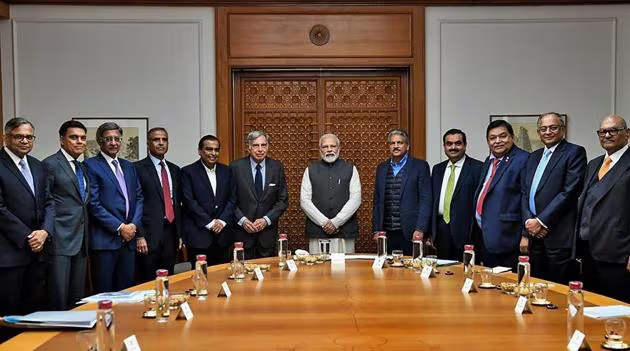Women have their own perspective based on their struggles to ascension. To exclude them from crucial meetings is to shut out the voices of nearly half of our population

Prime Minister Narendra Modi poses for a group photo with Reliance Industries chairman Mukesh Ambani, Tata Group patriarch Ratan Tata, Business tycoon Anand Mahindra and others during an interaction with business stalwarts .(PTI)
They flank the prime minister, six on one side, five on the other, dressed in sombre suits to discuss serious matters. The photograph was taken on January 6 when the 11 — variously described as “telecom czar”, “richest Indian”, and even “patriarch” — met with Narendra Modi ahead of the budget.
No “czarinas”. No “matriarchs”. Just an all-boys-club meeting to weigh in on the economy, talk about the need to spur growth and create jobs.
You would imagine that some women might have been invited, particularly since the prime minister’s flagship mission, Beti Bachao, Beti Padhao, is to do with female empowerment. You would imagine that some women might have had a seat at that table. After all, it’s 2020 and women are flying fighter planes and working on missions to space. But in the photograph, even our first full-time woman finance minister is missing.
It’s not that we don’t have capable women in industry. I can think of Kiran Majumdar Shaw, Anu Agha, Suneeta Reddy and all those who sparkle in finance and banking from Zarin Daruwala to Kaku Nahate.
This is not just about a symbolic photo-op. Women see things differently, have their own perspective based on their struggles to ascension. To exclude them from crucial meetings is to shut out the voices of nearly half of our population.
Did, for instance, the men around that table, talk about India’s precipitous fall in female labour force participation? Did they seek answers as to why only 24% of working age women are in paid employment, according to the 2018 Economic Survey? Did they talk about work-life balance and the burden of unpaid care work that falls on women? Unless you have women around the table, you are not going to hear their stories. You are going to have men deciding what’s best for everyone, and that includes us.
In a recent Global Gender Gap report, which looks at 153 economies on four parameters — political empowerment, economic participation, health and education — we slipped four places from 108 to 112. When gender exclusion stems from the top, it sends a signal down the line that it’s okay to keep women out. Not one of the 23 speakers at a recent award ceremony by an agritech company was a woman — this in a country where, according to Oxfam, women undertake 80% of farm work but own only 13% of the land. There were no women speakers at an auto conclave in Gurgaon this past week. Ditto for an electronic imaging fair earlier this month in Mumbai, points out writer Kiran Manral who has been tracking “manels”.
In a world where girls have breached gender gaps in primary and secondary education, and are striving to be heard and seen, it is anachronistic to whitewash the presence of women around decision-making conference tables. In the run-up to the budget, the prime minister will be hearing from those who count. Hopefully, women will make that cut.
Namita Bhandare writes on gender
The views expressed are personal